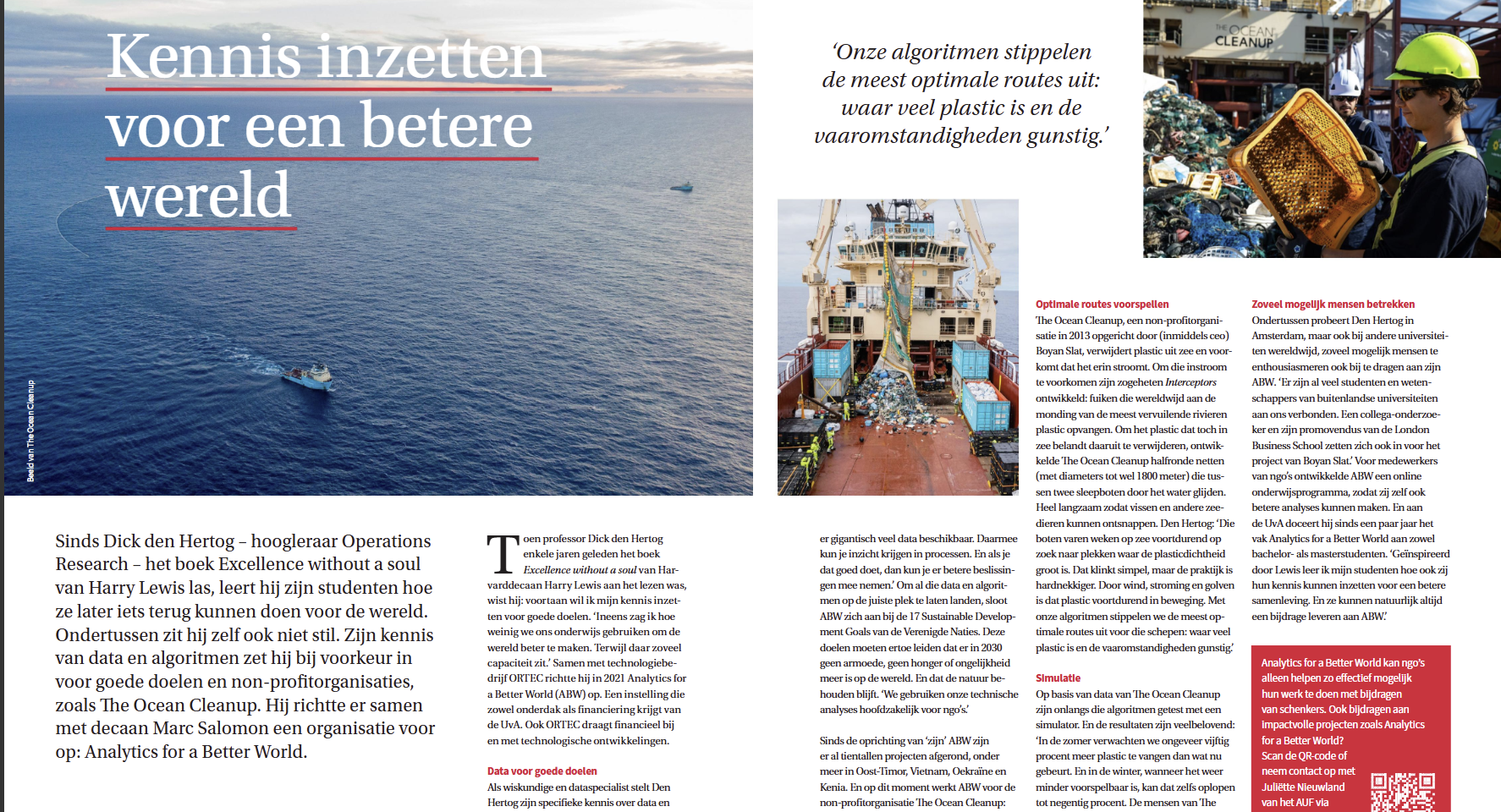
Applied Knowledge for a Better World – Professor Dick den Hertog in the Universiteit van Amsterdam Alumni Magazine
When Professor Dick den Hertog read Dean of Harvard Harry Lewis’ book Excellence Without a Soul a few years ago, he came to a realisation: from now on, he wanted to use his knowledge for good causes. ‘All of a sudden, I saw how little we use our education to make the world a better place. And there is so much potential there.’
He teamed up with technology company ORTEC to form Analytics for a Better World (ABW) in 2021. ABW is an institution both accommodated and funded by the UvA. ORTEC also contributes in the form of funding and technological developments.
Data for good causes
As a mathematician and data specialist, Den Hertog makes his specific knowledge of data and algorithms available for various good causes around the world. ‘The advent of computers and the internet has made a huge amount of data available. You can use this data to better understand processes. And if you get that right, you can make better decisions. To ensure that all this data and algorithms end up in the right place, ABW signed up to the United Nations’ 17 Sustainable Development Goals. The aim of the goals is to eliminate global poverty, hunger, and inequality by 2030. And to conserve nature. ‘We use our technical analyses mainly for NGOs.’
Since the founding of ‘his’ ABW, dozens of projects have been completed, including in East Timor, Vietnam, Ukraine, and Kenya. ABW is also currently working for the non-profit organisation The Ocean Cleanup: ‘We are helping them develop an optimal sailing schedule so that the boats can collect a lot more plastic.
Predicting optimal routes
The Ocean Cleanup, a non-profit organisation founded in 2013 by its current CEO Boyan Slat, removes plastic from the sea and prevents it from flowing into the sea in the first place. To prevent this inflow, it has developed a device called an Interceptor: a trap that collects plastic at the mouths of the most polluting rivers around the world. To remove the plastic that still ends up in the sea, The Ocean Cleanup has developed semicircular nets with diameters of up to 1,800 metres, which glide through the water between two tugboats. This is done very slowly so that fish and other marine species can escape. Den Hertog: “These boats are at sea for weeks, constantly on the lookout for locations where plastic density is high. It sounds simple, but it’s more difficult in practice. Wind, currents, and waves mean that the plastic is constantly moving. We use our algorithms to plot the best possible routes for these ships: where there is plenty of plastic and sailing conditions are favourable.”
Simulation
Data from The Ocean Cleanup has recently been used to test the algorithms with a simulator. And the results are promising: ‘In summer, we expect to catch around 50 per cent more plastic than is caught now. And in winter, when the weather is less predictable, this could even go up to ninety per cent.’ Den Hertog: “The people at The Ocean Cleanup are now incorporating our algorithms into their software and work process.”
Involving as many people as possible
Meanwhile, in Amsterdam, as well as at other universities around the world, Den Hertog is trying to encourage as many people as possible to also contribute to his ABW. ‘We are already working with many students and scientists from foreign universities. A fellow researcher and his PhD student from the London Business School are also working on Boyan Slat’s project.’ ABW has developed an online education programme to enable NGO employees to perform their own, more accurate analyses. At the UvA, Den Hertog has been teaching Analytics for a Better World as a subject to both Bachelor’s and Master’s students for a few years now. ‘Inspired by Lewis, I teach my students how they, too, can use their knowledge to create a better society. And, of course, they are always welcome to contribute to ABW. Any help is appreciated as the demand for our algorithms is high.’
Read the full story and learn how you can help us help in the English version or Dutch version of UvA Alumni Magazine.